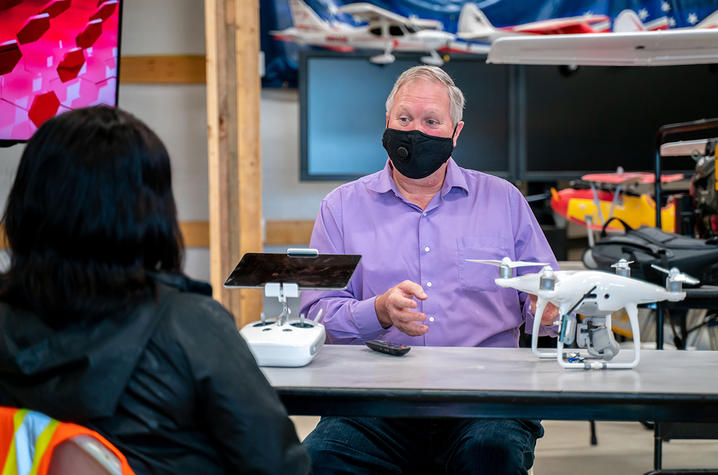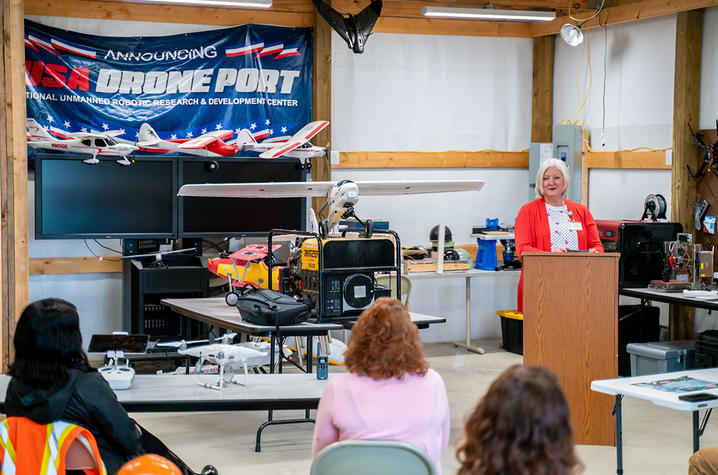USA Drone Port, UK-CARES and Kentucky Homeplace Partner to Bring PPE to Rural Kentuckians
LEXINGTON, Ky. (Dec. 15, 2020) — The COVID-19 pandemic introduced many new actions to our daily lives — wearing masks, washing hands more frequently, and watching our distance from others. Add these health behaviors on top of already existing challenges like isolation, transportation and access to health care, and creative solutions are more necessary than ever.
That’s why the UK Center for Appalachian Research in Environmental Sciences (UK-CARES) with the UK Center of Excellence in Rural Health, Kentucky Homeplace and the USA Drone Port joined forces this fall to explore the use of drones to deliver Personal Protective Equipment (PPE) to people in Appalachian Kentucky.
UK-CARES funded a pilot research project titled, “Access to Personal Protective Equipment for a High-Risk Appalachia Population using Aerial Drones and Community Health Workers,” also known as the Jericho Project.
Drones in Eastern Kentucky
The Jericho Project was born in March 2020, after a trip to Washington D.C. for the defense strategies meeting by Bart Massey, executive director of the USA Drone Port. “March 11, when I went to Reagan National to leave D.C., there were only three of us in the airport. It was an apocalypse almost,” Massey said.
“We got back to Kentucky and asked ourselves how can we do something to help people at risk — to get packages to people that have diabetes and need insulin or need batteries for their wheelchairs? We contacted the FAA, we talked to the National Guard. Nobody really had an answer for us legally how to do it, the methodology, or anything.”
But that didn’t deter Massey. His nonprofit USA Drone Port, located on a mountaintop in Knott and Perry counties, has been writing the book — 11 books, to be exact — to train drone pilots to do a variety of tasks. Massey, who says drones can do anything from conducting search and rescue operations, inspecting electrical and railroad lines and pulling fiber optic cable across lakes, is eager to train a drone workforce in Eastern Kentucky.
To date, the four-year-old USA Drone Port has trained 125 pilots through a partnership with Hazard Community and Technical College. He said, “We have been able to get grants. We're building a 9,000-square-foot building that'll be up next year. We have customers like the Department of Defense, and we were the first drone port to ever-present at the Paris Air Show.” These milestones are great, Massey says, but helping people in his community has always been his biggest goal, and the Jericho Project is an exciting opportunity to do just that.
Fran Feltner, director of the UK Center of Excellence in Rural Health in Hazard, Kentucky, says one community member, in particular, played a key role in bringing the partners together. “One of our community leaders, Robert Donovan, heard what was going on with the drone project. He knows about our community health workers in Kentucky Homeplace, and he wanted to connect the two.”
Massey said, “When my friend Robert asked me if I’d thought about the UK Center for Rural Health, I said, I hadn't, but it's a brilliant idea. They do amazing work.”
“When you live in rural areas of Kentucky, a lot of times you have to be inventive to find solutions for the population that you serve, and so to me this was a perfect match,” said Feltner.
UK-CARES Research Pairs Pilots with Community Health Workers
Four years ago, on the Lexington campus of the University of Kentucky, UK-CARES was formed thanks to grant funding from the National Institute of Environmental Health Sciences. “Our mission is to build capacity for environmental health sciences on campus and then in our target region, which is about 20 counties in Southeast Kentucky,” UK-CARES Director and College of Nursing Professor Ellen Hahn said.
In a March meeting with UK-CARES Stakeholder Advisory Board right after the pandemic hit, Hahn says, “We heard loud and clear that some of the people living in the region weren't really taking COVID as seriously as they should. They didn't have access to personal protective equipment like masks and gloves and disinfectant wipes. Knowing that there are a lot of remote regions in that part of the state, we started putting two-and-two together.”
What resulted was a proposal for a research project to document the feasibility of delivering PPE to at-risk, rural residents. The project pairs USA Drone Port with Kentucky Homeplace’s Community Health Workers.
Kentucky Homeplace, part of the UK Center of Excellence in Rural Health, provides access to medical, social and environmental services for Kentuckians in 30 counties.
“Community health workers just do enormous things, above and beyond what you would normally hear in health care, to reach out to people, to access their medication, access things that they need, like handicap ramps, housing repairs and transportation,” said Feltner.
There are 22 Kentucky Homeplace Community Health Workers, and two of them — Carole Frazier (Perry County) and Chyna Smith (Knott County) — are in process of recruiting clients of Kentucky Homeplace and coordinating the drone deliveries after completing training as “visual observers.”
A visual observer, Massey explains, is an extra set of eyes and ears for the drone pilot. “If we have a visual observer that's communicating from a site beyond, then we're able to do things at a further distance,” Massey said. The visual observers will train in radio communication and hand signals, aircraft identification to note elevation and direction, and relay hazards on the ground — like children or dogs that could grab the drone. “They'll have eight hours in class, and they'll have about four hours mentorship with the drone pilots,” said Massey.
Mace Baker, director of Kentucky Homeplace, said, “Whatever we take — hand sanitizers or masks — not only are we going to deliver that to our clients, but we're going to train them on the proper use of that. If you don't use it properly, it doesn't do any good.”
Feltner says that's where the community health workers come in. “They're from the counties they serve. They are excellent at interpreting the information and putting it the right way for people to understand it,” she said.
Massey is excited about documenting methodology and best practices for using commercially available, entry-level drones and supplies from the local hardware store to do package delivery. He said, “As the Federal Aviation Administration (FAA) allows this stuff to increase, we're looking at ways that the average drone pilot can go through the training with booklets we create to learn how to do it and pass the certification to do a package delivery. We're in the process of creating those resources, working with the FAA.”
Hahn says this project could bridge some of the gap in rural communities to bring needed supplies during the COVID-19 pandemic, but beyond that immediate need, it could provide a cost-effective way to do future air, water and soil sampling for environmental health studies. Hahn said, “I think people around the country are watching us to see what happens with this project.”
“You hear of all these things that happen in the big cities, and you don't necessarily hear about inventions and innovative things in rural Kentucky,” Feltner said, “If we can be on the forefront of innovation, I think it's just an awesome goal to reach between all of us.”







